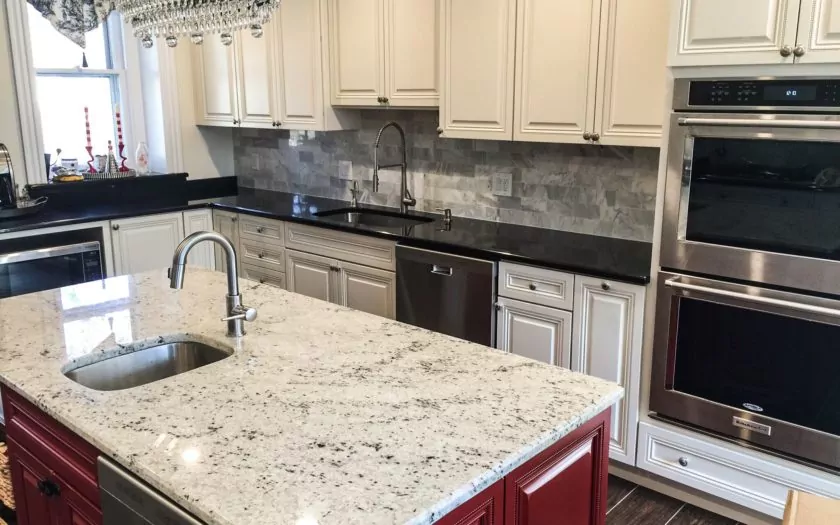Take a deep breath: no matter how much you might baby your stone countertop, scratches are inevitably going to appear. It happens to everyone at some point or another, and it’s nearly impossible to prevent — so cut yourself some slack! The good news is that minor scratches can be easily fixed no matter what kind of stone you have. Fixing scratches yourself can be done, and we’ve outlined some methods for those of you who prefer DYI. These DIY tips are also only for minor surface scratches. Deep scratches, as well as pits, will need to be fixed by a professional, as it will require special tools as well as the grinding down of the full countertop, plus resealing. When in doubt, bring in the professionals — better to have them do it right the first time!
Granite
Granite is one of the hardest stone surfaces you can buy and is not easily susceptible to scratches, especially those from knives or other kitchen utensils. However, scratches can occur, and will often show up more readily on lighter-colored stones.
Superficial scratches or barely noticeable scratches can sometimes be fixed yourself though due to the hardness of the stone it’s best to ask a professional. However, to DIY you can start by thoroughly cleaning the area and making sure it’s free from debris or abrasive particles that can cause additional scratches. Then, gently buff the scratch with dry 300-grit sandpaper or #0000 steel wool. Go slow and start in a very small, preferably unnoticeable area first. Once you’ve buffed out the scratch, clean the area with water and a soft cloth to remove any particles from the countertop and the sandpaper. Finally, apply two coats of granite sealer, waiting 48 hours between coats.
Marble
Marble is a much softer stone than granite that can be easily scratched. Like granite, you can use fine grit sandpaper or steel wool to very gently buff out the scratch, but be very careful not to introduce new scratches to the area. Then, flush the area with water to remove any abrasive particles, and then apply a special marble sealant to protect the countertop. If you have a polished marble surface, you can try specially-formulated marble polishing paste, which may help buff out a scratch and restore the surface. Just be sure to follow the manufacturer’s instructions!
Limestone
Like marble, limestone is one of the softest stones you can buy as a countertop. However, you can’t treat it like marble when you’re fixing scratches. Dark-colored limestones cannot be sanded, as scratches will often appear lighter and sanding will create a larger, more noticeable light area on the countertop. Instead, use a paper towel or a soft cloth to work mineral oil into the scratch. This won’t fill it or make it disappear per se but will help it blend into the surrounding area nearly seamlessly.
Lighter limestones can be buffed with fine-grit sandpaper-like marble and limestone, but be very careful and gentle so as to not introduce new scratches to the area. After flushing the area with water, you’ll want to work mineral oil into the affected area before sealing it to help protect the stone.
Man-Made Quartz
The most common type of quartz countertop is actually a composite of quartz chips and resin. This creates a granite-like speckled effect that is incredibly strong, resistant to scratches, and nonporous. In the event of a scratch or small pit, it’s also easy to fix because of the resin component. Simply fill in the scratch of a small pit with specially-formulated resin or epoxy and allow it to set for at least 24 hours or longer if recommended by the manufacturer. Then, you’ll want to remove the excess using a razor blade. Hold the blade at a 45-degree angle to the countertop and gently scrape to remove the excess material, using a gentle hand so as to not dislodge the whole filling. Although a clear epoxy or resin will work for most countertops, colored epoxies are also available if you want to try and match the color of your countertop. However, unless you can match the color exactly, you may want to go with a clear material. Otherwise, the scratch will have just become more noticeable!
Although getting a scratch on your stone countertop might seem like a big deal, it’s actually a very common and expected occurrence. As we said, fixing scratches is best left to the professionals, though many have had success with DIY repairs. If you decide to go the latter route, just be sure to go slow and stop if you think you’re doing more harm than good. It’ll be better to have a professional fix it right rather than get yourself into a bigger, more expensive problem! Got a question about fixing your countertop? Let us know, and we might just address the topic in a future post!

